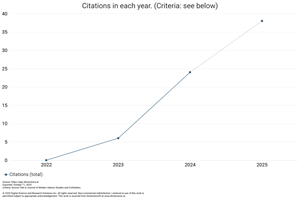Effort to Increase Student Learning Interes through Spiritual Intelligence Values
DOI:
https://doi.org/10.59653/jmisc.v1i01.3Keywords:
Interest in Learning, Value, Spiritual IntelligenceAbstract
The world of education as a center for forming good and quality human resources not only in terms of intelligence but emotionally and spiritually. The role of experts in the world of education is very important in the formation of quality human resources. The value of spiritual intelligence which is believed to be an intellectual and emotional balancer, builds life to be more meaningful and has psychological calm. Making students as individuals as well as possible, in all aspects, one of which is in the learning process. Interest in learning as one aspect of achieving good results. So in this study aims to examine efforts to increase students' interest in learning through the values of spiritual intelligence, with descriptive qualitative research on grade 3 students of MTs Darunna'im. Data collection through observation techniques, interviews and documentation is also supported by the results of analysis of primary and secondary data. Generating spiritual intelligence values possessed by students is very effective and influential in efforts to increase interest in learning.
Downloads
References
Anwar, M. S., Choirudin, C., Ningsih, E. F., Dewi, T., & Maseleno, A. (2019). Developing an Interactive Mathematics Multimedia Learning Based on Ispring Presenter in Increasing Students’ Interest in Learning Mathematics. Al-Jabar : Jurnal Pendidikan Matematika, 10(1). https://doi.org/10.24042/ajpm.v10i1.4445
Cama-Pinto, D., Damas, M., Holgado-Terriza, J. A., Arrabal-Campos, F. M., Martínez-Lao, J. A., Cama-Pinto, A., & Manzano-Agugliaro, F. (2023). A Deep Learning Model of Radio Wave Propagation for Precision Agriculture and Sensor System in Greenhouses. In Agronomy (Vol. 13, Issue 1). https://doi.org/10.3390/agronomy13010244
Franchini, G., Ruggiero, V., Porta, F., & Zanni, L. (2023). Neural architecture search via standard machine learning methodologies. Mathematics In Engineering, 5(1). https://doi.org/10.3934/MINE.2023012
Guardia, J. J., Del Olmo, J. L., Roa, I., & Berlanga, V. (2019). Innovation in the teaching-learning process: the case of Kahoot! On the Horizon, 27(1), 35–45. https://doi.org/10.1108/OTH-11-2018-0035
Harahap, F., Nasution, N. E. A., & Manurung, B. (2019). The effect of blended learning on student’s learning achievement and science process skills in plant tissue culture course. International Journal of Instruction, 12(1). https://doi.org/10.29333/iji.2019.12134a
Jamarudin, A., May, A., & Pudin, O. C. (2019). The Prospect of Human in the Exegetical Work: a Study of Buya Hamka’s Tafsir al-Azhar. Ulumuna, 23(1). https://doi.org/10.20414/ujis.v23i1.360
Knoop-van Campen, C. A. N., Segers, E., & Verhoeven, L. (2020). Effects of audio support on multimedia learning processes and outcomes in students with dyslexia. Computers and Education, 150. https://doi.org/10.1016/j.compedu.2020.103858
Nurmaliyah, Y., Aripin, S., & Nurdiansyah, N. M. (2023). 2013 Curriculum: Implementation of Islamic Religious Education Learning in Schools for Children with Special Needs. International Journal of Islamic Thought and Humanities, 2(1 SE-Articles), 124–138. https://doi.org/10.54298/ijith.v2i1.83
Obadire, O. T., & Sinthumule, D. A. (2021). Learner discipline in the post-corporal punishment era: What an experience! South African Journal of Education, 41(2). https://doi.org/10.15700/saje.v41n2a1862
Samul, J. (2020). Emotional and spiritual intelligence of future leaders: Challenges for education. Education Sciences, 10(7). https://doi.org/10.3390/educsci10070178
Sukendar, S., Endroyo, B., & Sudarman, S. (2018). Interest Students to be Productive Teachers Reviewed from Learning Achievement of Building Practices, Learning Achievement of Learning Practices and Learning Motivation. Journal of Vocational and Career Education, 3(1). https://doi.org/10.15294/jvce.v3i1.14006
Syukur, A., Nata, A., Rosyada, D., & Suralaga, F. (2023). Learning Management of Islamic Religious Education (PAI) Based on Multiple Intelligences at SMA IT Insan Mandiri Cibubur. International Journal of Islamic Thought and Humanities, 2(1 SE-Articles), 21–39. https://doi.org/10.54298/ijith.v2i1.52
Zohar & Marshall. (2000). SQ: Spiritual intelligence: The ultimate intelligence. Psychology and Psychotherapy, 75(January).
Downloads
Published
How to Cite
Issue
Section
License
Copyright (c) 2023 Siti Maryam

This work is licensed under a Creative Commons Attribution-ShareAlike 4.0 International License.
Authors who publish with this journal agree to the following terms:
- Authors retain copyright and grant the journal right of first publication with the work simultaneously licensed under a Creative Commons Attribution-ShareAlike that allows others to share the work with an acknowledgement of the work's authorship and initial publication in this journal.
- Authors are able to enter into separate, additional contractual arrangements for the non-exclusive distribution of the journal's published version of the work (e.g., post it to an institutional repository or publish it in a book), with an acknowledgement of its initial publication in this journal.
- Authors are permitted and encouraged to post their work online (e.g., in institutional repositories or on their website) prior to and during the submission process, as it can lead to productive exchanges, as well as earlier and greater citation of published work (See The Effect of Open Access).
























